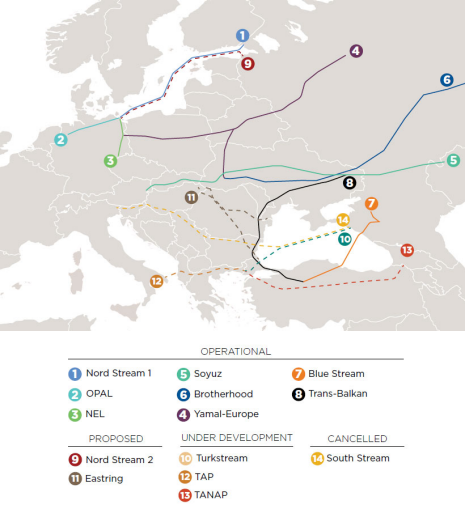GGP: The Kremlin's Gas Games In Europe: Implications For Policy Makers
The statements, opinions and data contained in the content published in Global Gas Perspectives are solely those of the individual authors and contributors and not of the publisher and the editor(s) of Natural Gas World.
This article was originally published by the Atlantic Council on 24 May 2017.
Gazprom is a monopoly gas company controlled by the Russian state. While the company presents itself as motivated solely by commercial logic and economic interest, it has a consistent track record of acting as an arm of the Kremlin’s foreign and economic policy. This paper provides an assessment of the choices facing the European Commission in regard to both Gazprom and Russia, as well as some background for the business community. In particular, the paper provides policy recommendations for US policy makers as the European Union (EU) negotiates on Gazprom’s latest pipeline project, Nord Stream 2, a proposed new export gas pipeline that would run from Russia to Western Europe below the Baltic Sea. Nord Stream 2 is slated to have the same throughput capacity as an existing pipeline, Nord Stream 1. The conclusion is that Nord Stream 2 is a politically motivated project that presents a major challenge to European law and EU principles, and jeopardizes the security interests of the United States and its EU allies.

Brief history of Gazprom in Europe
The Russian gas industry’s relationship with Europe has always been determined by the Kremlin. After the collapse of the Soviet Union in 1991, Boris Yeltsin partially privatized the Soviet Gas Ministry and renamed it Gazprom. The state always maintained majority control, however, and though there were efforts in the early days to make Gazprom behave as a private company, in practice, it evolved into a hybrid institution that brought foreign currency into the state budget, provided a slush fund for insiders, and could be deployed as a foreign policy tool in relations with the West and the former Soviet republics.
In the early 1990s, when gas prices were low and Russian relations with the West were warm, Russia restricted the political use of Gazprom to its immediate neighbors in the former Soviet space. That changed in the 2000s, with the accession of Vladimir Putin to the presidency. This period coincided with the beginning of an unprecedented rise in commodity prices, including gas. Putin, who had grander ambitions than his predecessor, quickly seized the opportunity to use Gazprom to further his political goals—most importantly by having Gazprom continue to link the price of gas to that of oil through long term contracts (LTCs). LTCs crucially included “destination clauses” that prohibited buyers from selling gas purchased from Gazprom to third parties, which ensured that Gazprom continued its bilateral trade with each European country separately, and allowed it to implement rigid take-or-pay clauses for piped gas, as opposed to more flexible contracts based on spot pricing and reduced intake obligations. Many countries that were heavily dependent on Gazprom’s gas were thus given a de facto choice: compromise with Russia on sensitive political and economic issues and receive favorable LTCs, or defy the Kremlin and pay high gas prices for years to come.
In 2009, the European Union, responding to Russian and North African attempts to dominate its internal gas markets, implemented the Third Energy Package. This legislative package, which came into force in September 2009, seeks to open more broadly the gas and electricity markets in the EU, while enforcing ownership separation or unbundling. In 2010–14, after demand for gas fell in Europe, competition from Norwegian producers, liquefied natural gas (LNG) suppliers, and spot traders increased, and customers started to challenge Gazprom’s pricing system and investment plans in arbitration courts. In the same period, Gazprom reluctantly agreed to include some limited spot pricing in its contracts. In 2011, its anti-competitive practices were exposed by a large EU Commission antitrust investigation, which revealed illegal practices in eight Eastern European countries where Gazprom continues to be a dominant or major supplier.
In addition to concerns over corrupt business practices, Gazprom’s operations are particularly disconcerting as the Kremlin uses the company to exert control over the post-Soviet space while deepening European dependence on Russian gas. The proposed construction of Nord Stream 2 would specifically allow Gazprom a strategic foothold in Germany, as the project “opens the prospect for Germany to become the main center for the transit and storage of Russian gas and its onward distribution in Western Europe.”
Full brief here.
By Ilya Zaslavskiy for Atlantic Council
The statements, opinions and data contained in the content published in Global Gas Perspectives are solely those of the individual authors and contributors and not of the publisher and the editor(s) of Natural Gas World.



